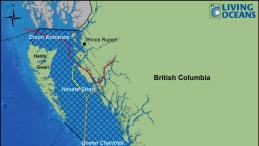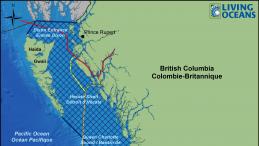Call for Pacific tanker ban intensifies: First Nations and coastal industries join forces in Ottawa to push for legislated solution
Delegation says oil tankers threaten coastal economies and communities
OTTAWA -– An unprecedented delegation of First Nations, commercial fishing, tourism representatives and environmental groups from Canada’s Pacific North Coast is in Ottawa today, calling on the federal government to ban oil tankers from the region.
The federal government is currently considering allowing over 200 oil tankers per year to travel through some of the most dangerous waters in the world, despite polls that show 80 percent of British Columbians support banning crude oil tankers.
“Our nations have declared a ban on oil tankers through our waters because a spill would kill our livelihoods and wipe out our culture,” said Art Sterritt, Executive Director of the Coastal First Nations, an alliance of nine First Nations. “We have used our ancestral law to ban tankers from our territories. The Liberals and NDP have recognized the importance of protecting this coast, and now it’s time for Parliament to join us in legislating a federal ban on tankers in this region.”
The delegation, which is joined by the United Fisherman and Allied Workers’ Union, the Wilderness Tourism Association, Living Oceans Society, Forest Ethics, Dogwood Initiative, West Coast Environmental Law and Exxon Valdez oil spill expert, Dr. Riki Ott, is meeting with elected officials to remind them that the region is home to the Great Bear Rainforest, humpback and killer whales and a vibrant coastal economy and ecotourism industry that employs literally tens of thousands of Canadians.
“The best business plan for my industry is a ban on oil tankers,” said Evan Loveless of the BC Wilderness Tourism Association. “Nature based tourism brings in $1.5 billion to British Columbia every year and is a major driver of British Columbia’s $13 billion tourism industry and Super Natural Brand. Tanker traffic and the constant threat of an oil spill would reduce growth of the tourism industry, while an actual spill would be devastating to it.”
"Our coastal communities depend on a healthy environment," said shoreworker Arnold Nagy of The United Fishermen and Allied Workers’ Union. “An oil spill will devastate the coastal economies that depend on the ocean’s resources. Our communities, economies and the fishing industry can’t afford the risk – it only takes one spill to wipe everything out. We must be willing to learn from past spills such as the Exxon Valdez and not follow the same path. We cannot put our coastal communities at risk to this threat. Parliament must act must act now and protect our interests.”
“Canada has a chance to stop disasters like the Exxon Valdez before they happen,” said Dr. Riki Ott, a marine biologist and fisher who experienced the Exxon Valdez first hand. “I’ve just spent six months observing the BP oil spill and I’ve seen how oil tears apart coastal communities and destroys the fish they rely on -- in my community in Alaska, the fish have never come back. Twenty-one years later and the oil is still on our beaches.”
Tofino chamber letter to PM supporting Bill
CFN - Yinka Dene Release Tanker Legislation
-30-
Contact Information
Jennifer Lash, Executive Director, Living Oceans Society: 250-741-4006
Nikki Skuce, Senior Energy Campaigner, ForestEthics: 778-210-0117


